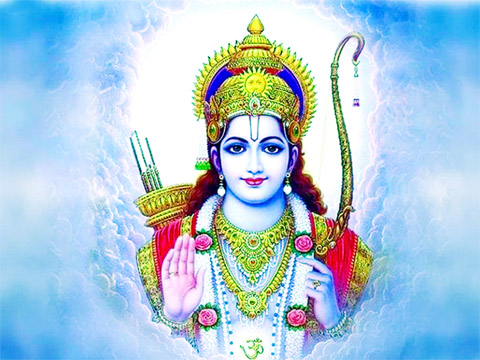
Ram Navami, also marks as the birth of Lord Rama, the seventh incarnation of Lord Vishnu, is being observed on Thursday, March 30, this year. The auspicious festival of Ram Navami coincides with the last day of Chaitra Navratri. Chaitra Navratri is an auspicious nine-day festival starting next week. The word “Rama” literally means one who is divinely blissful and who gives joy to others, and one in whom the sages rejoice.
According to Hindu mythology, Lord Rama was born on Navami Tithi during Shukla Paksha of Chaitra month. And hence, this day is celebrated as the birthday of Lord Rama each year.
It is believed that Lord Rama was born during the Madhyahna period which is the middle of the Hindu day. Madhyahna which prevails for six Ghatis (about 2 hours and 24 minutes) is the most auspicious time to perform Ram Navami Puja rituals, according to Drik Panchang.
Bhagwan Rama exemplified the perfect person (maryada purushottam). He was the embodiment of compassion, gentleness, kindness, righteousness and integrity. Although he had all the power in the world, he still was peaceful and gentle.
His reign in Ayodha is referred to as Ramarajya, the epitome of perfect governance. Ayodhya was the capital founded by the king-rishi Manu. During the reign of King Dasharath, Ayodhya reached a period of great prosperity. But Dasharath had one problem–he had no children. Therefore he decided to perform the ashvamedh sacrifice. Elaborate and difficult rituals had to be observed. Rishi Rishyashring presided over the yagya. The performance of this sacrifice was a great event in Ayodhya. At the end, Rishyashring recited a Mantra and made an offering to the fire. Then the gods, gandharvas, siddhas, and rishis present around began to pray to Brahma. During that time Ravana, the king of Lanka, was terrorizing the people, and they were longing for liberation from his menace. Ravana had acquired great power because he had obtained from God Brahma the boon that he would never die at the hands of gods, or gandharvas, or yakshas (demigods) or demons. As he was not afraid of men, he did not care to include men in the list of his potential slayers. So Brahmadev declared that Ravana would die at the hands of a man. Then the gods went to Vishnu for help and requested him that since Dasharath was a glorious king, that He take birth in the wombs of his three queens in four different incarnations of His divinity. When Dasharath’s sacrifice came to an end, a shining figure appeared over the sacrificial kund, and offered the king a divine beverage called “payasam”, which was to be given to his queens Kausalya, Kaikayi, and Sumitra. In due time, Kausalya gave birth to Rama, Kaikayi to Bharat and Sumitra to Laxman and Shatrugna.
The Sun is considered to be the progenitor of Rama’s dynasty, which is called the Solar Dynasty (Raghukula or Raghuvamsa – Raghu means Sun and Kula or Vamsa mean familial descendant). Rama is also known as Raghunatha, Raghupati, Raghavendra etc. That all these names begin with the prefix Raghu is also suggestive of some link with Sun-worship. The hour chosen for the observance of the Lord’s birth is that when the Sun is overhead and is at its maximum brilliance. In some Hindu sects, prayers on Ramnavami day start not with an invocation to Rama but to Surya (Sun). Again the syllable Ra is used in the word to describe the Sun and brilliance in many languages. In Sanskrit, Ravi and Ravindra both mean “Sun”.
Significance
The story of the Ramayan is a classic, eternal, universal message of Dharma versus adharma, of deva versus demon, of good versus evil, as represented in the battle between Rama and Ravana. Ravana was a brahmin; he was a great scholar who wrote numerous works on scriptural philosophy. He was powerful, dynamic, and beautiful in appearance. As the brilliant, handsome king of Lanka, he had everything one would need to be happy and peaceful. Yet, he was arrogant, egoistic, greedy and lustful. His insatiable desires led him to crave more and more power, more and more money, and more and more ladies to fulfill his every whim.
There is one main difference: Bhagwan Rama’s heart overflowed with divinity, love, generosity, humility, and a sense of duty. Ravana’s heart, in contrast, was filled with avarice, hatred, and egoism. Under Bhagwan Rama’s divine touch, the animals became his devotees and his divine helpers. Under Ravana’s touch, even humans became animals.
Through his noble and divine choices, he teaches the world to choose dharma over Artha (when he leaves for the forest rather than be coronated as King) and to choose Moksha over Kama (when he chooses his kingdom over his marriage).
Bhagwan Rama teaches that :
As a son
Respectfully and lovingly obey your father’s orders. Sacrifice your own comfort for your father’s dignity.
As a step-son
Even when your step mother (or mother-in-law) is not kind to you, even when she clearly dis- criminates against you in favor of her own birth child, do not resent her, do not fight against her. Respect her and her wishes.
As a brother
Remain loyal to your brother. Care for him.
As a husband
Protect your wife. Fight for her protection and her purity. But there are times when one’s divine path must even take precedence over the path of householder. Do not keep the role of householder as the ultimate role.
As a King
Sacrifice everything for your people. Do not worry about your own comfort, your own convenience or your own pleasure. Be willing to put the kingdom ahead of your own needs.
Pilgrimage
People visit sacred places associated with Lord Ram during this holy time. Places like Ayodhya, Ujjain and Rameshwaram attracts thousands of devotees across the country. In Rameshwaram, thousands take a ritual bath in the sea before worshipping at the Ramanathaswamy temple. Many places in North India host fairs in connection with the festival, culminating in spectacular fireworks on Rama Navami.
It is said that the repetition of his name (Rama Nama) is the surest, fastest and easiest way to attain purity, peace, wisdom, understanding, joy, prosperity and ultimately liberation. Bhagwan Rama Himself said, “Repetition of My name once is equal to the repetition of one thousand names of God or to the repetition of a Mantra one thousand times.”





Be the first to comment